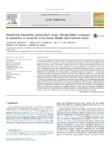Use este identificador para citar ou linkar para este item:
http://www.alice.cnptia.embrapa.br/alice/handle/doc/1006749| Título: | Monitoring Tetranychus urticae Koch (Acari: Tetranychidae) resistance to abamectin in vineyards in the Lower Middle São Francisco Valley. |
| Autoria: | MONTEIRO, V. B.  GONDIM JÚNIOR, M. G. C.   OLIVEIRA, J. E. de M.   SIQUEIRA, H. A. A.   SOUSA, J. M.   |
| Afiliação: | VANESKA B. MONTEIRO, UFRPE; MANOEL G. C. GONDIM JÚNIOR, UFRPE; JOSE EUDES DE MORAIS OLIVEIRA, CPATSA; HERBERT A. A. SIQUEIRA, UFRPE; JOSILENE M. SOUSA, UFRPE. |
| Ano de publicação: | 2015 |
| Referência: | Crop Protection, v. 69, p. 90-96, 2015. |
| Conteúdo: | In the Lower Middle Sao Francisco Valley, Tetranychus urticae Koch is controlled by the application of acaricides; however, the intensive use of these products in this region has caused control failures in the field. In the present study, concentrationeresponse curves were constructed periodically to monitor the toxicity of abamectin to T. urticae in two vineyards over two years. Diagnostic concentrations of 1 mg and 9 mg of abamectin/L water were established based on the monitoring period to detect T. urticae resistance in different vineyards in the region. Concentration-response curves were obtained for abamectin, bifenthrin and carbosulfan for the populations considered resistant to abamectin. T. urticae were confined in arenas on cotyledonary leaf discs from jack bean (Canavalia ensiformis L.) that had been immersed in acaricide solution. Mite mortality was assessed after 48 h of exposure to the acaricides. The lethal concentration (LC) values varied over time in both of the vineyards studied, which was most likely a result of crop management. An additional 35 vineyards were sampled, and 20 additional populations were established. The results indicated that 45% of the populations exposed to the 9 mg/L abamectin diagnostic concentration experienced less than 80% mortality and were considered resistant to abamectin. The frequency of resistant mites ranged from 4.1% to 80.4%. The resistance ratio ranged from 2406-fold to 8272-fold compared to susceptible populations in the laboratory. Resistance to bifenthrin was also confirmed in the present study, though resistance to carbosulfan was not. No cross-resistance between abamectin and bifenthrin was observed though this requires further investigation. |
| Thesagro: | Entomologia Uva Ácaro Controle Biológico Tetranychus Urticae |
| NAL Thesaurus: | Biological control Grapes |
| Palavras-chave: | Vale do São Francisco Two-spotted |
| Digital Object Identifier: | 10.1016/j.cropro.2014.12.012 |
| Tipo do material: | Artigo de periódico |
| Acesso: | openAccess |
| Aparece nas coleções: | Artigo em periódico indexado (CPATSA)  |
Arquivos associados a este item:
| Arquivo | Descrição | Tamanho | Formato | |
|---|---|---|---|---|
| Eudescpatsa.pdf | 495,43 kB | Adobe PDF |  Visualizar/Abrir |









